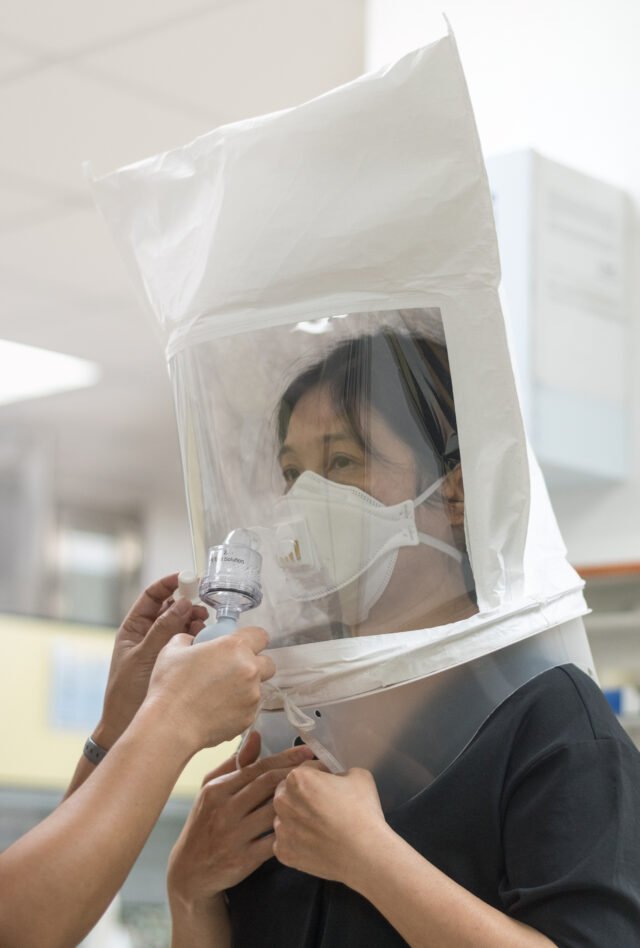Healthcare:
Healthcare workers, especially those dealing with infectious diseases may need fit testing. RPE is crucial for healthcare workers who come into close contact with patients with infectious diseases. Fit testing helps ensure that the FFP3 masks create an effective seal on the healthcare worker’s face. An inadequate seal could lead to exposure to infectious diseases and compromise the safety of both the healthcare worker and the patients they are caring for.
Fit testing in healthcare settings is especially critical during outbreaks of contagious diseases like influenza, tuberculosis, or more recently, during the Covid-19 pandemic
Construction Workers:
In many cases, construction workers may need mask fit testing, particularly when they are required to wear respiratory protective equipment (RPE) such as dust masks or respirators. The need for mask fit testing in construction depends on the specific work being performed and the presence of airborne hazards that could pose a risk to workers’ respiratory health.
Construction workers often encounter dusty, fume-filled, or otherwise hazardous environments, such as those involving:
- Dust from cutting, drilling, grinding materials like concrete, wood, or drywall.
- Welding and metalwork, which can produce fumes and gases
- Use of chemicals or solvents in construction processes
- Demolition work, which can release particulates and potentially hazardous materials
- Air quality may be compromised in confined spaces
When working in environments with these hazards, it is essential to protect the respiratory health of construction workers. Respiratory protection, such as FFP3 respirators or other types of dust masks, may be required to prevent inhalation of harmful particles or gases. Fit testing ensures that the chosen RPE forms a proper seal on the worker’s face, minimising the risk of exposure.
Oil and Gas:
Oil and gas workers often need mask fit testing, especially if they are required to wear respiratory protective equipment (RPE) such as gas masks or self-contained breathing apparatus as part of their work. The oil and gas industry involves a variety of tasks and work environments that can expose workers to potentially harmful gases, fumes, and particulates. Fit testing is crucial to ensure that the RPE forms a proper seal and provides effective protection against these hazards.
Oil and gas workers may require mask fit testing in the following situations:
- H2S Exposure
- Confined Spaces
- Drilling and Well Operations
- Refineries and Chemical plants
- Firefighting
Stonemasons:
Stonemasons may need face fit testing if their work involves exposure to airborne hazards such as dust, silica particles, or other contaminants that could pose a risk to their respiratory health. Face fit testing is crucial to ensure that the respiratory protective equipment (RPE), like dust masks or respirators, forms an effective seal on the stonemason’s face and provides adequate protection.
Here are some considerations related to stonemasons and face fit testing:
- Silica Dust Exposure
- Ventilation
- Regulatory Requirements
Asbestos and Lead Abatement:
The asbestos and lead abatement process is specialized in removing or controlling hazardous materials such as asbestos and lead-based paint in order to protect both workers and the environment. Asbestos abatement is the process of removing or containing materials that contain asbestos, a naturally occurring mineral fibre known for its fire resistance and durability but associated with serious health risks when disturbed. Inhaling asbestos can cause diseases such as asbestosis, lung cancer, and mesothelioma. Abatement is crucial to prevent exposure.
In older buildings, lead abatement refers to the management and removal of lead-based paint and other sources of lead exposure. Lead is toxic, especially to children, and can lead to developmental and cognitive issues. Abatement is essential to prevent lead poisoning.
Asbestos and lead abatement require trained and certified professionals who understand the risks involved. Abatement is necessary to protect not only the workers directly involved but also building occupants, neighbouring properties, and the environment.
